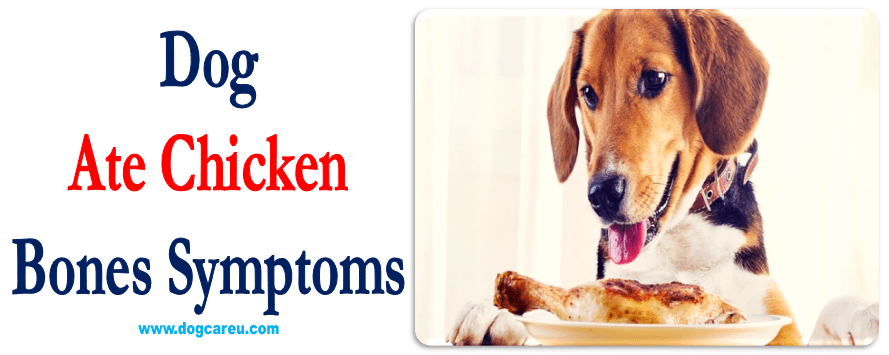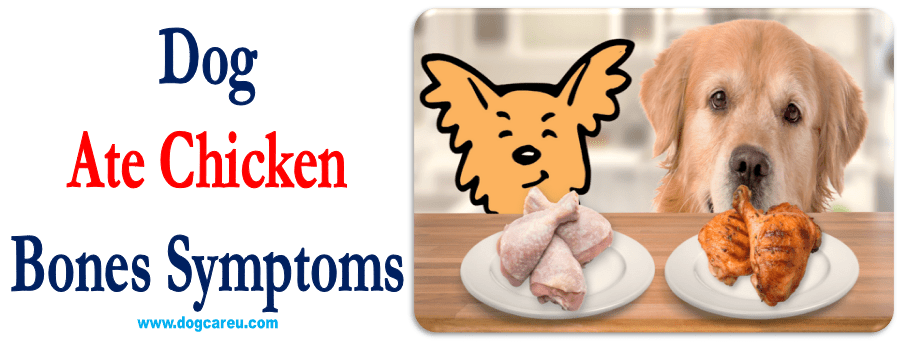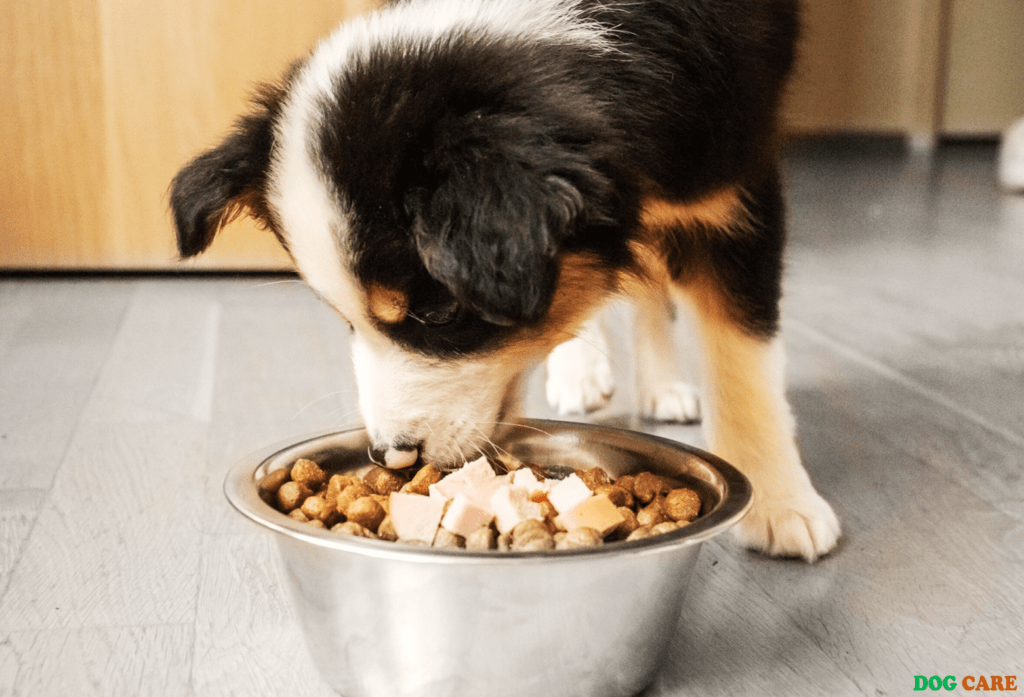Dog Ate Chicken Bones Symptoms may include vomiting, diarrhea, abdominal pain, and difficulty passing stools. When a dog ingests chicken bones, it can lead to serious health issues such as gastrointestinal blockage or puncturing.
It’s vital to monitor your dog for any signs of discomfort and seek immediate veterinary care if these symptoms are observed. The consumption of chicken bones is a common problem, as dogs are naturally attracted to them for their taste and smell.
However, it’s important to remember that chicken bones can pose significant risks to your dog’s health. We will explore the symptoms associated with a dog eating chicken bones and discuss the necessary actions to take when dealing with this situation.

Symptoms Of Dogs Eating Chicken Bones
Dogs are known for their love of food, but sometimes their enthusiasm can get the best of them. If your furry friend has managed to gobble up some chicken bones, it’s important to be aware of the potential risks and symptoms that can arise. Here are some common symptoms to watch out for:
Vomiting And Diarrhea
Bones, especially chicken bones, can pose a serious threat to dogs’ digestive systems. One of the most noticeable symptoms of dogs eating chicken bones is vomiting and diarrhea. If you notice your dog repeatedly throwing up or experiencing frequent loose stools, it could be a sign that the bones have caused irritation or obstruction in their intestines. This is a serious condition that requires immediate attention from a veterinarian.
Abdominal Pain And Distress
Another symptom of dogs consuming chicken bones is abdominal pain and distress. If your dog seems uncomfortable and is displaying signs of discomfort such as restlessness, whining, or reluctance to move, it could be an indication that the bones have caused internal injury or blockage. It’s crucial to monitor your dog closely and seek professional help if these symptoms persist or worsen.
It’s important to remember that every dog is unique, and the symptoms they exhibit may vary. While some dogs may show immediate signs of distress, others may not display any symptoms initially. Therefore, it’s always better to err on the side of caution and seek veterinary care if you suspect your dog has consumed chicken bones.
Vital Signs To Watch For
Keep an eye on your dog for signs like vomiting, diarrhea, and abdominal pain if they’ve ingested chicken bones. Look out for difficulty in bowel movements or signs of discomfort. Seek immediate veterinary care if your dog displays any of these symptoms.
Changes In Appetite And Thirst
One of the vital signs to watch for when your dog has eaten chicken bones is changes in their appetite and thirst. Pay close attention to any alterations in how much your dog eats or drinks. Signs of reduced appetite may include your dog refusing to eat their regular meals or only picking at their food.
They may show disinterest or disengagement during meal times. It is important to note that a temporary loss of appetite can happen due to various factors, but if it persists for more than 24 hours, consult your veterinarian. [Break] Increased thirst is another possible symptom to keep an eye on. If your dog seems more thirsty than usual or is drinking larger amounts of water compared to their normal drinking habits, this could be an indication that something is amiss. [Break]
Behavioral Changes
Behavioral changes can also be indicative of potential problems caused by ingesting chicken bones. Observe if your dog displays any unusual behaviors or appears lethargic. Changes in energy levels might include your dog being less active than usual, sleeping more than normal, or seeming overly tired. If your dog lacks their usual enthusiasm for walks or playtime, it could be a sign that they are not feeling well. Restlessness or agitation may also manifest as behavioral changes.
Your dog might appear restless, unable to settle comfortably, or continuously pacing. These signs could indicate that they are experiencing discomfort or pain in their digestive system. Keeping a close eye on your dog’s appetite, thirst, and behavioral changes is crucial when they have eaten chicken bones. These vital signs can give you important insights into their overall health and well-being. If you notice any worrisome symptoms, it is always best to consult your veterinarian for further evaluation and guidance.

Frequently Asked Questions Of Dog Ate Chicken Bones Symptoms
How Long After Eating Chicken Bones Would A Dog Get Sick?
It varies, but dogs can get sick from chicken bones within 24 hours after ingestion. The sharp bones can cause choking, blockages, or punctures in the digestive system, leading to symptoms like vomiting, diarrhea, and abdominal pain. It’s important to seek veterinary care immediately.
How Long Does It Take A Dog To Digest A Bone?
A dog typically takes about 12 to 48 hours to digest a bone.
What Do I Do If My Dog Ate A Cooked Bone?
If your dog ate a cooked bone, monitor for symptoms like vomiting, diarrhea, or discomfort. Contact your vet for advice. Avoid giving more bones.
How Much Bread Should I Give My Dog After Eating Chicken Bones?
To help your dog after eating chicken bones, give them a small amount of bread. It can help to cushion the bones and aid digestion. However, it’s best to consult your vet for proper guidance.
Conclusion
In case you notice any of these symptoms after your dog has ingested chicken bones, it’s crucial to seek veterinary care immediately. Timely intervention can make a significant difference in your dog’s health and well-being. Remember, prevention is always the best approach, so be proactive in keeping hazardous items away from your pet’s reach.


